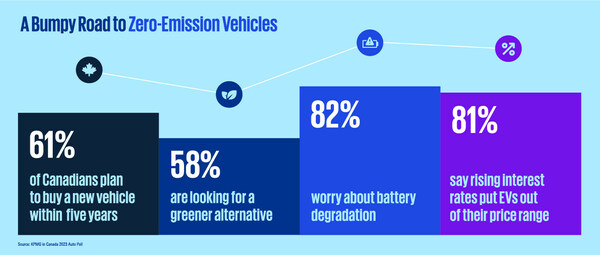As many as six in 10 Canadians will buy a new vehicle within the next five years and would prefer a greener alternative to carbon-emitting gasoline-powered vehicles, but most say they will end up in an internal combustion engine (ICE) powered one instead.
According to a new KPMG in Canada poll, Canadians expect concerns over financing cost, battery range, and charging reliability will keep them opting for an ICE-powered vehicle for their next purchase.
“It’s not that EVs have lost their appeal but rather that lack of inventory and long waiting lists over the past couple of years are giving consumers reasons to pause,” says Damiano Peluso, Partner and National Automotive Industry Leader, KPMG in Canada. “And now with expectations of a recession and sharply higher financing rates, our poll research shows consumer sentiment has shifted to pragmatism over ‘the machine of a dream’.
“As more EV models come to market this year and next, we will see sales pick up but a lot hinges on the price point and how well these persistent concerns about range and charging infrastructure can be addressed,” he says.

Key Poll Highlights:
- 61 per cent of Canadians plan to buy a new vehicle within the next five years, of whom 42 per cent will buy within the next two years, or by 2025
- More men (67 per cent) than women (56 per cent) will look to buy a new vehicle within the next five years
- More than two thirds (67 per cent) planning to buy within the next five years want to spend less than $50,000 on a new vehicle: 42 per cent, in the $30,000 to $49,999 price range, and 25 per cent, less than $30,000. Twenty-one per cent say they are willing to spend $50,000 to $74,999 on a new vehicle. The remaining 12 per cent are willing to spend more than $75,000.
- 58 per cent who plan to buy a new vehicle by 2033 say they want a greener vehicle: hybrid (30 per cent), a battery EV (15 per cent), and a plug-in EV (13 per cent). The remaining 42 per cent prefer a gas-powered internal combustion engine (ICE) powertrain.
- The primary factors preventing Canadians from buying an EV were:
- 33 per cent say their EV hesitancy relates to many factors combined: the cost of an EV, charger anxiety, including the lack and reliability of charging stations, limited EV availability and long-wait times, and skepticism over battery technology
- Over a quarter (26 per cent) say EVs are too expensive
- 14 per cent cite charger anxiety and lack of infrastructure
- 8 per cent say limited EV availability and long-wait times are preventing them from buying an EV
- 7 per cent say the primary reason is that they don’t trust battery technology
- 81 per cent say rising interest rates are making EVs cost prohibitive, shifting them out of their price range. Still, two thirds (67 per cent) expect financing rates will fall or even normalize in a couple of years by the time they purchase an EV, reducing this barrier to ownership.
- 67 per cent would buy a new vehicle directly from the automaker, bypassing auto dealerships
- 81 per cent feel that auto dealerships are under immense pressure to improve sales and service especially if OEMs start selling directly to consumers
- 30 per cent couldn’t wait a year or more for an EV or PHEV so they purchased a used gas-powered vehicle in the interim
- 44 per cent won’t wait more than a year for an EV and 47 per cent won’t wait more than a year for a PHEV, among those who want to buy an EV and PHEV
The Key Market Shift
Automakers may need to rethink their footprints and supply chains. Canadians are price sensitive, and while they crave range, they also say the only way to make EVs accessible to everyone is to go small, the KPMG poll shows.
Yet only 55 per cent would buy a small EV (with limited range) if the country had a ubiquitous fast-charging infrastructure and 80 per cent say they won’t consider an EV without a 400-kilometre range.
There is also opportunity for automakers and auto dealers to pick up market share. Almost half of market is open to change, the poll shows. Only 54 per cent of respondents intend to buy a ZEV that’s the same brand as their current make. With many new EV models set to debut this year, the top three brands that prospective Canadian EV buyers say they’re most likely to purchase now are: Toyota, Honda, and, dropping from top spot last year to third, Tesla.
Over two-thirds (67 per cent) would prefer to buy an EV assembled in North America and half (51 per cent) are concerned the transition to EV manufacturing will result in more job losses in the Canadian auto industry.
According to KPMG International’s 23rd Annual Global Automotive Executive Survey, over 910 executives around the world have tempered worldwide EV sales forecasts and are concerned about supplies of commodities and components. They also believe consumer buying decisions in the next five years will focus on the importance of driving performance and brand image.
“While our survey shows that most Canadians want to buy an EV that’s made in North America, important decisions are still being made on battery, assembly, and parts manufacturing locations,” says Tammy Brown, Partner and National Leader, Industrial Markets, KPMG in Canada.
“As a result, the domestic market may not be able to meet the federal zero-emission vehicle targets, which may force Canadians to buy a greater share of imported electric vehicles.
“The global auto industry took nearly 13 decades to perfect the internal combustion engine and are now trying to meet consumer and regulatory expectations for electric vehicles in just two decades,” says Ms. Brown. “We’re optimistic it can be done, with Canada playing a key role given our robust auto manufacturing and innovation ecosystem and proximity to key U.S. markets. The challenge is, it’s an entirely new industry dependent on commodities that have yet to be mined in Canada and components that can, as we’ve seen, become scarce.”
Other Poll Highlights:
Is Small an Option?
- 71 per cent of Canadians believe automakers will need to pivot to make smaller EVs given limited supplies of raw materials for batteries for Canada to meet its zero-emission vehicle (ZEV) targets
- 71 per cent say EVs need to be financially accessible to everyone, which means smaller vehicles with smaller battery packs
- Yet only 55 per cent say that they would buy a small EV with a small battery pack with less range so long as the country was blanketed with a ubiquitous fast-charging infrastructure network
- 80 per cent say they won’t consider an EV unless it can run for a minimum of 400 km on a fully charged battery
Charging Anxiety Lingers
- 79 per cent feel governments should subsidize the cost of home EV chargers
- 82 per cent say battery degradation remains a huge concern
- 77 per cent are not convinced that battery technology is evolving fast enough for automakers to meet Canada’s ZEV targets
- 83 per cent believe Canada needs to adopt an EV charging uptime standard and regulatory framework to track reliability and determine responsibility
- 88 per cent expect auto dealers to provide battery range upgrades and/or a battery replacement warranty
- 83 per cent expect their auto dealer to help them figure out the battery pack technology, capacity, and range that they will need based on their driving habits
Buy Here, What, From Who?
- 67 per cent say they would prefer to buy an EV assembled in North America rather than one imported from another region
- 38 per cent say they would buy an EV made by a major technology company, compared to 49 per cent a year earlier
- 54 per cent say that they will most likely buy a ZEV that’s the same brand as their previous vehicle
- Half (53 per cent) would explore buying hydrogen fuel cell electric vehicles (FCEVs)
- 70 per cent support government spending to fund and encourage the building of a charging infrastructure that supports FCEVs
- 51 per cent worry there will likely be more job losses in Canada’s auto industry in the EV transition
- 79 per cent think the auto industry will face perpetual supply chain issues over the next decade
- 65 per cent are frustrated by the auto industry’s microchip shortage and half (50 per cent) don’t think vehicles really need all these microchips
KPMG in Canada researched the opinions of 2,001 Canadians between Dec. 21, 2022, and Jan. 13, 2023, on Schlesinger Group’s Asking Canadians panel using the Methodify online platform. The poll represents a nationally representative sample of adults 18+ across Canada and has a margin of error of +/- 2 percentage points with a confidence level of 95 per cent. Note: some figures may not add up to 100 per cent due to rounding.


0 Comments